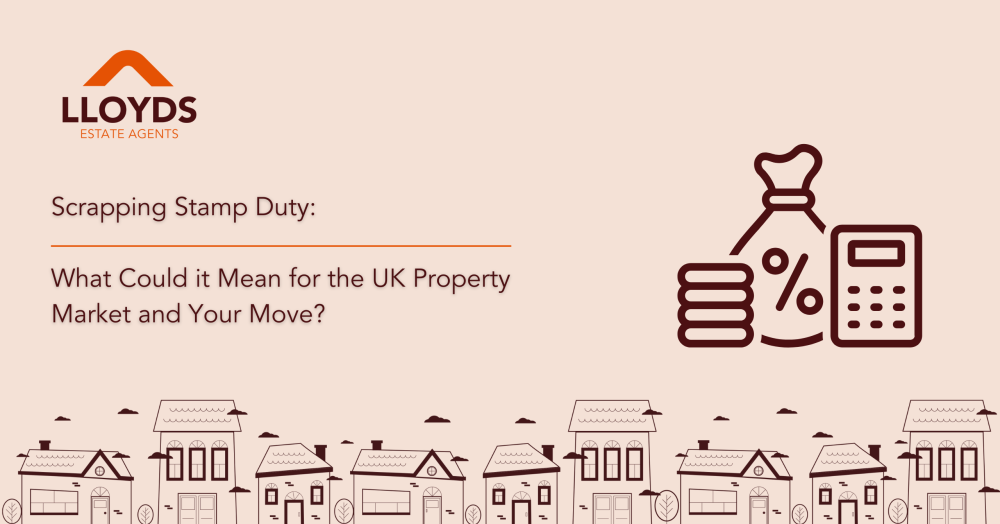
Scrapping Stamp Duty: What Could it Mean for the UK Property Market and Your Move?
Imagine a world where buying a home doesn't come with the hefty additional cost of Stamp Duty. For many, this sounds like a dream come true, potentially unlocking new opportunities and making the moving process a little less daunting. The Conservative Party's recent proposal to scrap Stamp Duty Land Tax (SDLT) has certainly got people talking, but what are the real implications, and how might the figures stack up for the government?
What is Stamp Duty and Why Does it Matter?
First, a quick recap. Stamp Duty is a tax paid by buyers when purchasing a property or land over a certain price in England and Northern Ireland. The amount you pay depends on the property's value and whether you're a first-time buyer, moving home, or buying an additional property. For many, it represents a significant upfront cost, often thousands of pounds, which can impact affordability and the ability to move up or down the property ladder.
For example, buying a £400,000 home as a standard buyer currently incurs £7,500 in Stamp Duty. For a £600,000 home, that jumps to £17,500. These are not small sums, and they can often be the difference between securing a dream home and having to compromise.
The Proposal: A Game-Changer for Buyers?
The Conservative Party's proposal suggests completely abolishing Stamp Duty. The immediate benefit for buyers is clear: a substantial reduction in the upfront costs of purchasing a home. This could make homeownership more accessible, particularly for first-time buyers who are already grappling with rising house prices and mortgage rates. It could also encourage more movement in the market, as existing homeowners might feel less constrained by the tax when considering a move.
Think of Sarah and Tom, a young couple saving for their first home. Scrapping Stamp Duty on a £350,000 property would save them £2,500 – a sum that could go towards furniture, moving costs, or even a slightly larger deposit. For a family looking to upsize from a £300,000 home to a £500,000 one, the saving of £12,500 would be transformative, making their next step much more achievable.
Potential Implications for the Property Market
If Stamp Duty were to be abolished, we could see several shifts:
- Increased Transaction Volumes: With a major barrier removed, more people might be encouraged to buy and sell, leading to a more active market.
- Boost to Property Prices: Some economists suggest that the savings from Stamp Duty could simply be absorbed into higher property prices, as buyers have more to spend. This could be a concern, especially in areas with high demand.
- Economic Stimulus: A more active property market often has a ripple effect, boosting related industries like removals, home improvements, and retail.
- Impact on Government Revenue: This is where the figures get interesting. Stamp Duty generates billions for the Treasury each year. In the 2022-23 financial year, SDLT receipts totalled £13.7 billion. Scrapping it entirely would leave a significant hole in government finances.
How Would the Figures Work Out for the Government?
This is the million-pound question. To offset the loss of Stamp Duty revenue, the government would need to find alternative income streams or make significant spending cuts. Some potential arguments for how it could work include:
- Increased Economic Activity: Proponents might argue that a booming property market would lead to higher tax revenues elsewhere, such as Capital Gains Tax from increased property sales, VAT from increased spending on home-related goods and services, and increased income tax from a more active workforce in related sectors.
- Broader Tax Reform: It could be part of a larger package of tax reforms, where other taxes are adjusted to compensate for the loss.
- Long-Term Vision: The government might view it as a long-term investment in the housing market and broader economy, accepting an initial revenue hit for future gains.
However, critics would highlight the immediate and substantial revenue gap, questioning the feasibility without clear plans for replacement income. The Office for Budget Responsibility (OBR) would likely need to provide detailed forecasts on the potential impact.
Our Perspective: Honest Advice, No Jargon
At our core, we believe in putting people before property. While the idea of scrapping Stamp Duty is exciting for many, it's crucial to understand all angles. As your trusted local experts, we're here to help you navigate these discussions and understand what potential changes could mean for your personal circumstances.
Moving home doesn't have to be stressful – let's make it easier together. Whether you're considering a move now or planning for the future, we're here to offer honest advice, keeping you informed with honest market updates. We listen. We care. We deliver. Get in touch today for a friendly chat about your property journey.